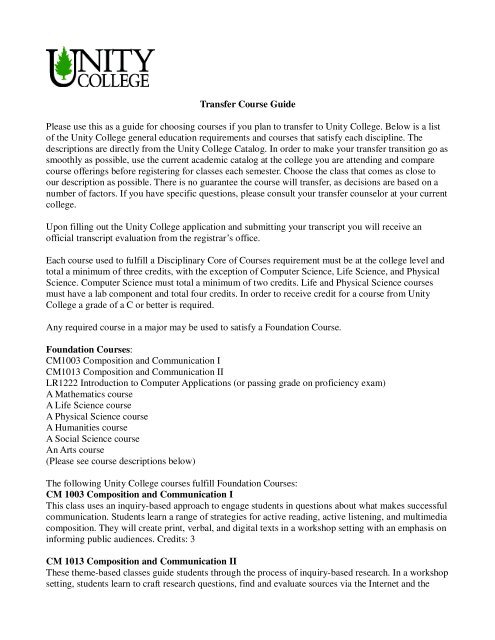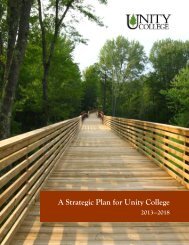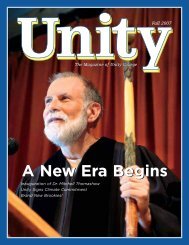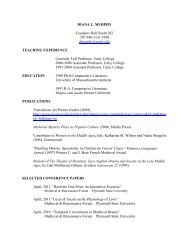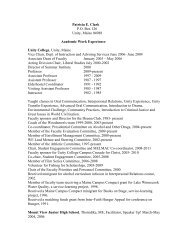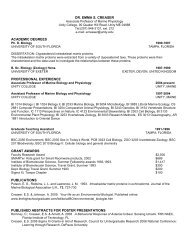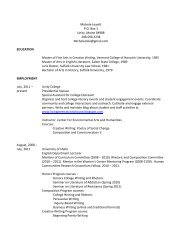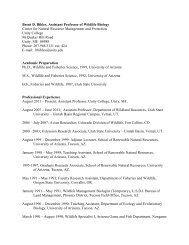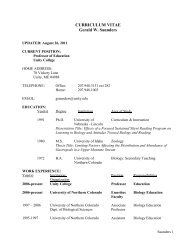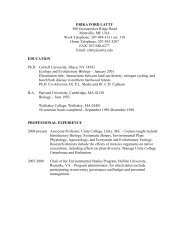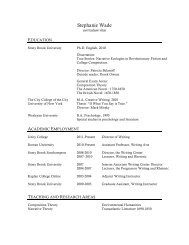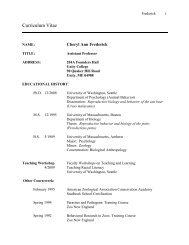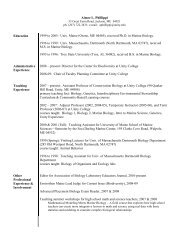Guide - Unity College
Guide - Unity College
Guide - Unity College
Create successful ePaper yourself
Turn your PDF publications into a flip-book with our unique Google optimized e-Paper software.
Transfer Course <strong>Guide</strong><br />
Please use this as a guide for choosing courses if you plan to transfer to <strong>Unity</strong> <strong>College</strong>. Below is a list<br />
of the <strong>Unity</strong> <strong>College</strong> general education requirements and courses that satisfy each discipline. The<br />
descriptions are directly from the <strong>Unity</strong> <strong>College</strong> Catalog. In order to make your transfer transition go as<br />
smoothly as possible, use the current academic catalog at the college you are attending and compare<br />
course offerings before registering for classes each semester. Choose the class that comes as close to<br />
our description as possible. There is no guarantee the course will transfer, as decisions are based on a<br />
number of factors. If you have specific questions, please consult your transfer counselor at your current<br />
college.<br />
Upon filling out the <strong>Unity</strong> <strong>College</strong> application and submitting your transcript you will receive an<br />
official transcript evaluation from the registrar’s office.<br />
Each course used to fulfill a Disciplinary Core of Courses requirement must be at the college level and<br />
total a minimum of three credits, with the exception of Computer Science, Life Science, and Physical<br />
Science. Computer Science must total a minimum of two credits. Life and Physical Science courses<br />
must have a lab component and total four credits. In order to receive credit for a course from <strong>Unity</strong><br />
<strong>College</strong> a grade of a C or better is required.<br />
Any required course in a major may be used to satisfy a Foundation Course.<br />
Foundation Courses:<br />
CM1003 Composition and Communication I<br />
CM1013 Composition and Communication II<br />
LR1222 Introduction to Computer Applications (or passing grade on proficiency exam)<br />
A Mathematics course<br />
A Life Science course<br />
A Physical Science course<br />
A Humanities course<br />
A Social Science course<br />
An Arts course<br />
(Please see course descriptions below)<br />
The following <strong>Unity</strong> <strong>College</strong> courses fulfill Foundation Courses:<br />
CM 1003 Composition and Communication I<br />
This class uses an inquiry-based approach to engage students in questions about what makes successful<br />
communication. Students learn a range of strategies for active reading, active listening, and multimedia<br />
composition. They will create print, verbal, and digital texts in a workshop setting with an emphasis on<br />
informing public audiences. Credits: 3<br />
CM 1013 Composition and Communication II<br />
These theme-based classes guide students through the process of inquiry-based research. In a workshop<br />
setting, students learn to craft research questions, find and evaluate sources via the Internet and the
library, and create persuasive print and digital texts. Credits: 3<br />
** Generally, English Comp I, English Comp II, and an Oral Communications class at other colleges<br />
will satisfy CM1003 and CM1013. All three courses must be successfully completed at another college<br />
to count for the two CM courses above.<br />
LR 1222 Introduction to Computer Applications<br />
This course introduces the Microsoft Office software applications of word processing (Word),<br />
spreadsheet (Excel), data base (Access), and presentation (Power Point). The emphasis of this class is<br />
on the concepts and hands-on teaching of computing and problem solving. The internet, as well as<br />
email etiquette, web browsers, web search, and desktop operating systems will be introduced. Concepts<br />
and procedures will be introduced and discussed in the lecture prior to the hands-on lab where students<br />
apply learned skills. Independent projects will be completed that coincide with each software<br />
application. A passing grade in this course fulfills the computer proficiency graduation requirement.<br />
Credits: 2<br />
** Students may test of out of this requirement with a passing grade on the computer proficiency test<br />
given in your first semester at <strong>Unity</strong> <strong>College</strong>.<br />
Math courses: Courses with a course code of MA<br />
Examples:<br />
MA 1223 Algebra and Trigonometry<br />
This course is a sequel to LR 1123 and concludes our algebra sequence. Students continue their study<br />
of algebra and analytical geometry, and begin their study of trigonometry. Further topics from algebra<br />
including exponential and logarithmic functions, along with introductory topics from trigonometry<br />
including circular functions, trigonometric and invers trigonometric functions, and solutions to right<br />
and oblique triangles will be studied. The course is designed to develop an understanding of the topics<br />
from algebra and trigonometry essential to the study of calculus. Credits: 3<br />
MA 2243 Elementary Statistics<br />
This course deals with various introductory topics from probability and statistics with emphasis on the<br />
interpretation of experimental data. Students will study descriptive statistics, probability distributions.<br />
And inferential statistics (tests of hypotheses). In addition, students will actually do statistics using<br />
technology tools such as the TI-83 calculator, Microsoft Excel or the campus wide statistics package<br />
JMP. Credits: 3<br />
MA 2333 Calculus I<br />
Calculus is the mathematics of change. Calculus I deals with an introduction and treatment of the major<br />
concepts and techniques of differential calculus. Students will study the heuristic, visual and algebraic<br />
approaches to: difference equations, limits, and rates of change of functions (derivatives). Applications<br />
of derivatives will include optimization and differential equations used in modeling. Credits: 3<br />
Physical Science courses: Courses with a course code of CH, GL, PS (The course that fulfills this<br />
requirement must have a lab component)<br />
Examples:<br />
CH 1104 General Chemistry I<br />
This first part of a two-semester course is designed to provide an introduction to the nature and<br />
properties of matter at the atomic and molecular level. Topics covered will include chemical problem<br />
solving, measurement, significant figures, components of matter, aqueous solutions, origin of atoms,<br />
structure of atoms, structure and reactivity of molecules, and chemical reactions. Credits: 4
GL 1003 Physical Geology<br />
Physical Geology is the gateway course to the geosciences and serves to introduce students to the<br />
fundamental components of the Earth-Atmosphere system. Our exploration into the field of geology<br />
begins with some basic principles and mapping, and rapidly shifts into hard-rock geology (igneous,<br />
sedimentary, and metamorphic rocks), composition of Earth materials, and soils. From there, we move<br />
into a water-related section of the course covering stream processes and other surficial waters,<br />
groundwater, and glaciers. We conclude with a section on plate tectonics, structural geology, natural<br />
hazards, and volcanoes. The geosciences is a discipline that emphasizes observation and visualization,<br />
hence, lectures are riddled with images of the landscape, animations, and schematics to aid in<br />
understanding the physical environment. Labs serve as a critical complement to course material by<br />
providing hands-on exercises, opportunities for first-hand visualization, and other applied learning<br />
activities. A lot of the geosciences rely heavily upon observation of the natural environment, and many<br />
of our labs include fieldtrips to do just that. Students should possess basic reading, comprehension, and<br />
computation skills in order to successfully complete this course and its lab components. Credits: 3<br />
PS 2303 General Physics I<br />
The first in a two-semester sequence, this course focuses on energy and mechanics. Topics covered<br />
include motion and force. The associated laboratory section includes both hands-on and computerized<br />
explorations. Credits: 3<br />
Life Science course: Courses with a course code of BI (The course that fulfills this requirement must<br />
have a lab component)<br />
Example:<br />
BI 1114 Biology: Diversity of Life<br />
Skills and foundational knowledge in this course prepare students to be knowledgeable citizens of a<br />
planet with numerous environmental challenges, most of which are based in biology. Students will<br />
engage in scientific inquiry, gain a clear sense of the nature and process of science, use quantitative<br />
information, develop professional communication skills, and appreciate the role of natural history in<br />
science. Topics will include the study of DNA and inheritance, the evolution of life, systematics and<br />
classification, matter and energy transfer through ecosystems, and ecological connections made<br />
relevant through the study of current environmental issues. Credits: 4<br />
Social Science courses: Courses with a course code of AN (except AN 3003), EC, GY, SY, PL, PY<br />
Examples:<br />
AN 1123 Cultural Anthropology<br />
Anthropology is the study of culture as a human creation: its origins, development or evolution, and<br />
possible future. The course covers the range of variation in human life-styles and basic cultural<br />
similarities. There will be an examination of selected tribal, peasant, and industrial cultures, with an<br />
emphasis on how biological, cultural, and ecological factors shape them. Comparative technology,<br />
kinship, social structure, religion, magic, art, economics, cultural change, and applied anthropology<br />
will be discussed. Credits: 3<br />
EC 2013 Introduction to Economics and Economic Criticism<br />
This course examines the basic principles of neo-classical economics. It includes supply-demand<br />
theory, consumer choice theory, and theory of the firm. Macroeconomic and trade theories are also<br />
introduced. In each case students briefly examine the major alternate points of view. Students solve<br />
basic problems and perform calculations using the theories learned. Credits: 3
GY 1003 Geography<br />
Geography describes, relates, and explains both the natural and cultural features that distinguish<br />
different areas on the face of the earth. At the same time geography is concerned with the phenomena<br />
of continual change: the ways people modify their environments as reflections of changes in cultural<br />
values and levels of technology; and the ways the physical environment presents opportunities and<br />
constraints for human development. Credits: 3<br />
PL 1013 American Democracy<br />
This course approaches the basic history, structure, and character of American politics, governmental<br />
institutions, and laws through the exploration of concepts and issues in areas such as civil liberties,<br />
federalism, judicial review, political parties, interest groups, and the role of media and public opinion.<br />
A key assignment is semester-long analysis, reporting, and presentation by each student on multiple<br />
aspects of a unique US House or Senate campaign in progress. Credits: 3<br />
PL 2013 State and Local Government<br />
Reading, lectures, essay-writing, in-class presentations, research projects, discussion, debate, roleplaying,<br />
group exercises, video viewing, and a field trip to the Maine State Capitol are some of the<br />
tools this course uses to understand state and local government practice and policy. The aim is to bring<br />
governing to life. Students will analyze and communicate, orally and in writing, the history and current<br />
status of important state and local policy issues. Credits: 3<br />
PY 1013 Introduction to Psychology<br />
This course is a survey of psychology as a science of behavior. Topics include basic principles<br />
underlying behavior and experience, learning, human development, motivation, personality, and<br />
psychotherapies. Credits: 3<br />
SY 1013 Introduction to Sociology<br />
Sociology is a field of study that explains social, political economic, and ecological phenomena in<br />
terms of social structures, social forces, and group relations. This introduction focuses on socialization,<br />
culture, the social construction of reality, inequality, race and ethnic relations, poverty, and political<br />
sociology. Students gain an understanding of the three main sociological perspectives, apply them to<br />
make sense of contemporary social problems, and realize how one’s individual circumstances are<br />
shaped by much larger social forces. Credits: 3<br />
Humanities courses: Courses with a course code of HU<br />
Examples:<br />
HU 1003 Spanish I<br />
This course is an introduction of the use of the Spanish language with its emphasis on active<br />
communication through conversation, as well as the skills of reading and writing. The course features<br />
hands-on communicative activities which will involve pair and group work. Students also develop<br />
some rudimentary knowledge about the cultures of the Spanish-speaking world. This course is designed<br />
for the beginning student with no previous experience in Spanish. Credits: 3<br />
HU 2003 American History from Post-Civil War to the Present<br />
This class covers American history from post-Civil War Reconstruction to the present through an<br />
examination of the major ideas and forces that shaped the country during this period. The class will<br />
focus on particular themes and periods, including the meaning of freedom, especially as it emerged<br />
from Emancipation and Reconstruction and reached some measure of fulfillment in the civil rights<br />
movement in the 1950s and 1960s; the profound social, economic, and political effects of the
industrialization of America between the collapse of Reconstruction and World War I; the progressive<br />
political reform that culminated in FDR’s New Deal and which still, in many ways, defines the terms of<br />
our political debate today; the post-World War II prosperity and growth that not only propelled America<br />
onto the global stage as a superpower, but remade our landscapes at home with the suburbanization of<br />
America; and the rise of cultural and political conservatism, beginning in the 1970s and continuing<br />
today against the background of increasing globalization and global change. Students will be<br />
encouraged to understand these developments not simply as historical facts, but as a point of departure<br />
to think about their relevance to current events. Credits: 3<br />
Art courses: Courses with a course code of AR (except AR 3133)<br />
Examples:<br />
AR 1013 Drawing<br />
The course develops the process of drawing from reality, stressing both skill and individual expression<br />
by exploring volume, space, form, value, and materials. Credits: 3<br />
AR 1023 Ceramics<br />
Ceramics is a hands-on studio class using clay as a means of expressing the self in the environment. A<br />
variety of hand building, wheel forming, surface finishing, glazing, and firing techniques will be<br />
explored. At the same time, how artisans in other times and other cultures used clay and how the<br />
objects they made functioned in their respective societies will be considered. Credits: 3<br />
AR 2003 Introduction to Drama<br />
This course will investigate the drama as literature and as theatrical production, with special emphasis<br />
on the great periods of Western theatre. Representative plays from ancient Greek to modern times,<br />
including Japanese Noh plays, will be read and discussed in terms of production characteristics.<br />
Various methods of play production, stagecraft, costuming, lighting, etc. will be studied. Trips to<br />
theatre productions will be a required part of the course. Credits: 3<br />
AR 2013 Painting<br />
An introductory course designed to establish a working familiarity with traditional techniques of<br />
painting. The semester will be based on painting from actual conditions. There will be an emphasis on<br />
how to see and interpret color and form in two dimensions. Credits: 3<br />
AR 2023 Photography<br />
This introductory course focuses on basic camera use and image production. Special attention will be<br />
devoted to learning to “see” photographically: to discern qualities of light and composition. Credits: 3


